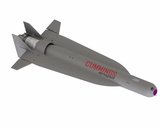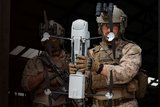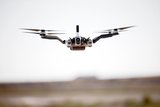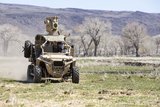AUKUS nations test AI-enabled UAV that destroys ground targets
Drones from all three participating nations collaborated in the test. (Photo: US DoD)
The AUKUS nations of Australia, the US and the UK have developed an AI-enabled uncrewed aerial vehicle (UAV) and successfully tested it in real time.
The vehicle, which had the fundamental goal of being able to disable or destroy ground targets, let a human operator achieve that goal through a fusion of autonomous flight and data-powered AI sensing.
The achievement is significant as it marks the first time the two technologies, autonomy and AI, have been used collaboratively in a real-time military setting.
The combination of AI and autonomous systems was used to reduce the time the vehicle took to identify enemy targets, and to ensure it could disable or destroy those targets with a reduced risk to human life. The testing brought together several drones from each of the three nations, working collaboratively in the real-time test.
Commodore Rachel Singleton, head of the Defence Artificial Intelligence Centre (DAIC) and UK lead for the AUKUS AI and autonomy working group, explained the value of the tripartite relationship in the testing and future operation of the UAV.
“The AUKUS partnership is key to ensuring that the systems designed by each nation are interoperable into the future,” Singleton said. “Service personnel from one nation will be supported by capabilities that have been developed across all three nations.”
During the trial, data from each nation’s systems was exchanged seamlessly, encouraging Singleton’s optimism on the future interoperability of the UAV across national mission parameters.
The trial was part of this year’s US-hosted multinational Project Convergence experimentation exercise. The first such AUKUS trial took place in April 2023 and the successful real-time collaboration is a marker of significant progress since that inaugural attempt.
Once the technology has been more extensively tested and proven, it is expected to be incorporated onto all three national platforms, giving the military organisations of the AUKUS nations greater protection from the likes of electronic warfare, ground-based laser weaponry and GPS attacks.
Related Programmes in Defence Insight
More from Uncrewed Vehicles
-
![Cummings Aerospace showcases Hellhound loitering munition designed for US Army’s LASSO programme (video)]()
Cummings Aerospace showcases Hellhound loitering munition designed for US Army’s LASSO programme (video)
Cummings Aerospace presented its turbojet-powered Hellhound loitering munition at SOF Week 2025, offering a man-portable solution aligned with the US Army’s LASSO requirements.
-
![SOF Week 2025: PDW unveils attritable FPV drone for SOF operations at scale]()
SOF Week 2025: PDW unveils attritable FPV drone for SOF operations at scale
PDW has revealed its Attritable Multirotor First Person View drone at SOF Week 2025, offering special operations forces a low-cost, rapidly deployable platform for strike and ISR missions, inspired by battlefield lessons from Ukraine.
-
![SOF Week 2025: Teledyne FLIR white paper provides guidance on reusable loitering munitions]()
SOF Week 2025: Teledyne FLIR white paper provides guidance on reusable loitering munitions
Teledyne FLIR is highlighting the emerging requirements for 'recoverable and re-usable' loitering munitions across the contemporary operating environment during this week’s SOF Week conference in Tampa, Florida.
-
![SOF Week 2025: Kraken Technology group debuts K3 Scout USV in North America]()
SOF Week 2025: Kraken Technology group debuts K3 Scout USV in North America
High-performance maritime industry player Kraken Technology Group, based in the UK, has used the SOF Week conference in Tampa, Florida this week to debut its K3 Scout uncrewed surface vessel (USV) to the North American market.
-
![Palladyne AI and Red Cat to demonstrate capabilities for autonomous drone swarms to the US military]()
Palladyne AI and Red Cat to demonstrate capabilities for autonomous drone swarms to the US military
Red Cat and Palladyne AI recently conducted a cross-platform collaborative flight involving three diverse heterogeneous drones.
-
Jammer resistant drone designs spark search for countermeasures
The Russia-Ukraine conflict has driven another stage of evolution for drones and the counter measures to defend against them.

























